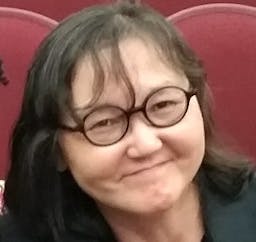Michiyo Tani, Director of Futaba Care Home
Jan 21, 2015
Story
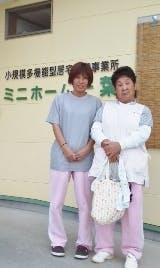
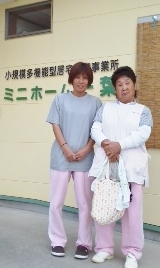
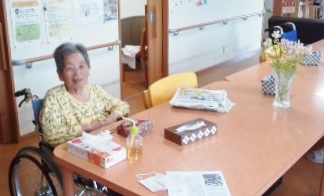
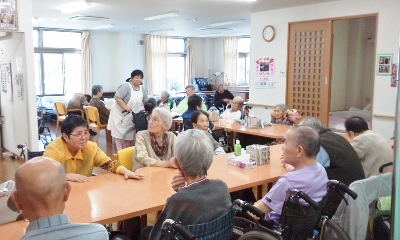
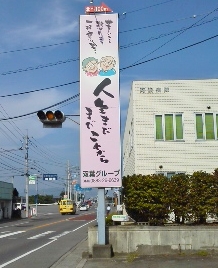
Growing number of elderlies is a serious problem in Japan. Most elderlies are 65 years or older, retired and unable to take care of themselves, but require daily assistance. On the contrary, child population is decreasing every year because couples today produce less than two children in their life time. By 2012, the number of elderly rose to 25.1% of the total population, which means one elderly in every four persons.
One way to deal with this problem in Japan has been the establishment of elderly care homes. Futaba Corporation is such a home, located in Ichiba-shi, Tokushima-ken, Japan. Its entrance has a colorful sign board painted with joyous faces of male and female elderlies, which reads, “We overcame all pains and sorrow, now is our time of life that has just began!”
Ms. Michiyo Tani manages Futaba Corporation’s care homes in 15 different locations. The service consists of providing board, feeding and toilet assistance, medical and health care for the elderly with the help of 130 employees. Ms. Tani is a short woman with typical Japanese features. Giving her a glance, you might mistake her figure for demureness. But she is a strong, down-to-earth individual who dedicatedly provides care for her clients who are silently awaiting death, but also empowers her staff who are mostly overworked and underpaid by the government.
Employed by the Futaba Corportation for the past 10 years, and she is selected precisely for her managerial skills. Her main duty is to oversee the total management of the home. She is in charge of clients care service and employee management in cooperation with business partners, agencies and people in the local communities, along with the operation of the health care framework of the home. Seemed much to deal with, I asked her what her major problem was. Immediately she answered, “The unmatched needs and wants between the clients and the employees.” I can imagine a chaotic scenario in which, a client may refuse to eat, and another may fall down while others may try to escape when all nurses are busy.
“How do you resolve it?” To my question, she said “I do not resolve it myself, but ask for suggestions from my employees, `This is what the clients want, what can we do?’—Believe me, If I answer the question myself, the employees will not be happy. If they give me suggestions, I will tell them to do it. Because they find the answer themselves, they will get the work done. I am always welcoming to any opinions and ideas.”
Intrigued by her approach to work, I asked her, “In the world, women leaders are underrepresented. Women’s CEOs represent only 5% of men’s CEOs according to S&P 500 statistics. How do you think that you were able to climb up the ladders?” To this, she lists that the important qualities of women in leadership: communication, listening skills and bringing creative ideas. She believes that what made her stand out in her job is her keen sense of learning. She said simply, “I like to observe people.”—“For example, when my superiors are doing some work, I observe. I think through in my mind, what this person wants and needs? I also search for what is not done. When I find some problems, I try to come up with answers or ideas. I am constantly thinking ‘What is the problem that this person is going through?’ and this gave me favor from the management board.”
Because of the overwhelming number of elderlies in society, many young nurses and helpers are frustrated with the situation. Recently, a young helper murdered clients in a care home in Osaka. There have also been reports about the use of physical violence and abusive language against elderlies in many homes. In such a scenario, it is not easy to uphold the humanity as a crucial factor in the world of welfare. So I asked her what effort she made to instill humanitarian values into her employees. She expressed “I am always inquiring with my employees about their work.” She says that humanity—love of people—cannot be delivered from knowledge, skills or even positions. Everything boils down to one’s desire to care for others. She repeats telling them that their actions determine the clinents’ quality of life because they are defenseless. Your warm smile, kind words and actions can only make their clients feel that life is worth living.” In today’s world, where people assume materialistic reward for whatever they contribute to others, she emphasizes that humanity without reward or punishment.
Although welfare workers are encouraged to care for others as their first priority, in reality, short of helping hands, low wages, and high responsibilities make it tough to achieve. In viewing this, I asked her if she has any success in motivating the employees. She replied, “I work with them interpersonally. When the employees are stressed for any reasons, I take them out for lunch. I listen to them and talk things out.” I was touched by her selfless devotion to the work of humanity without any incentive. She feels she has to do it because elderly need her.
I explained to her that this article will be published in World Pulse and people around the world may see it. “Do you think you can use this approach to any other fields of work?” She said modestly that she only worked for medical and care homes, so did not know whether it could be applicable to any other fields. I told her that her approach works for our NGO.
Lastly, within decades, baby boomers will become elderlies. By 2060, almost a half of the populations in Japan will be elderlies. There will be less workers because of less children being born today. Is she thinking about future times? “Do you consider hiring foreigners?” Her reply was that, “Yes, as a matter of fact, I teach nursing for elderly in schools to women from around the world.—We already have women from Indonesia and China.” I showed her the newsletters from our NGO, Support Women and Children in Nigeria. I asked her whether she considers employing women from Nigeria. She said ‘Yes.’ Clearly, she has similar vision with our NGO searching toward a more humane society; It was an interview that I felt she has become much closer.
This article is part of a writing assignment for Voices of Our Future a program of World Pulse that provides rigorous digital media and citizen journalism training for grassroots women leaders. World Pulse lifts and unites the voices of women from some of the most unheard regions of the world.
